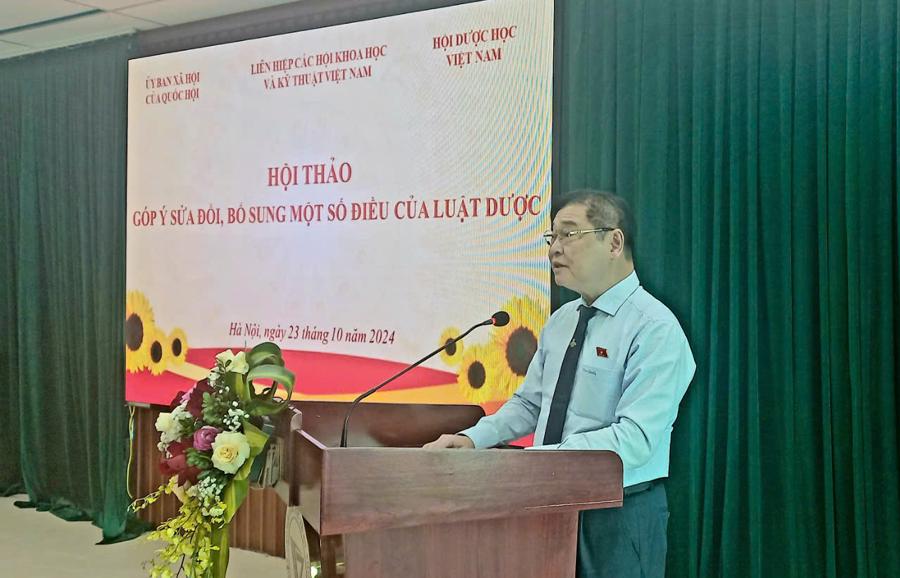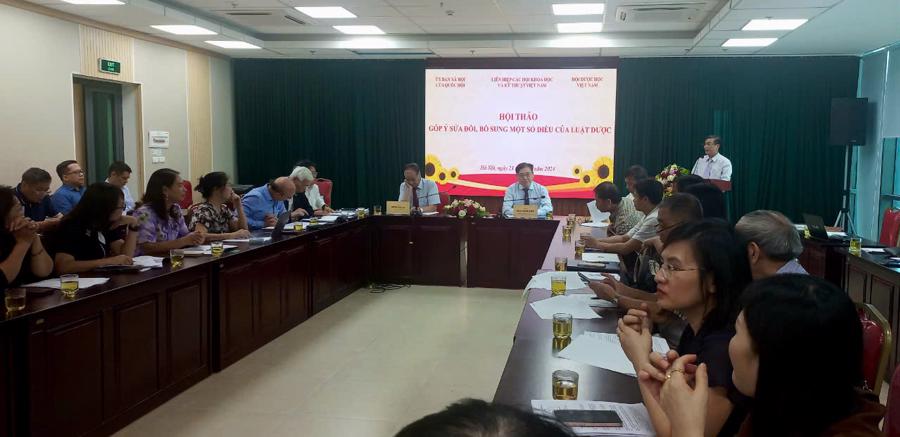A Workshop to Discuss Amendments to the Pharmaceutical Law, held in Hanoi on October 23, received valuable feedback from experts and scientists in the Vietnamese pharmaceutical field.
Streamlining Procedures While Maintaining Drug Quality
Addressing the workshop, Prof. Dr. Phan Xuan Dung, President of the Vietnam Union of Science and Technology Associations, shared that after more than eight years of implementing the 2016 Pharmaceutical Law, the pharmaceutical industry has contributed to protecting and caring for people’s health through various mechanisms, policies, and legal documents.
However, urgent demands from practical situations have revealed limitations and inadequacies in the pharmaceutical legal system, as indicated in the Government’s report. Some issues include:
– Inconsistencies between drug and ingredient registration procedures and administrative reform initiatives.
– Quality management regulations that do not align with decentralization policies.
– Lack of breakthrough policies for the development of the pharmaceutical industry in the new period.
– Price management regulations that are impractical and inconsistent with the new Price Law (2023).
– Business and business model regulations that need adjustments to keep up with the country’s development and international integration.
– Advertising regulations that burden businesses and contradict administrative reform goals.
– Registration, production, import, and supply regulations that are inadequate for emergency situations, such as the COVID-19 pandemic, or national security and defense matters.
Prof. Dr. Dung emphasized that it is essential to address these issues, incorporate the views of the Party and the State, and adapt to socio-economic changes and international integration. With Vietnam’s current standing and potential, including a population of over 100 million and a ranking of 35th in the world for economic scale, we are now in a position to introduce new policies that couldn’t be implemented eight years ago when the 2016 Pharmaceutical Law was enacted.

Therefore, he asserted the necessity of drafting amendments and supplements to the Pharmaceutical Law to overcome these challenges.
According to Prof. Dr. Dung, the National Assembly will continue discussing and approving the Law at its 8th session, and these amendments carry significant practical implications.
While the Government, the Ministry of Health, and other agencies have already made adjustments, it is crucial to consider additional contributions from experts and scientists to address practical challenges promptly.
“There are pressing issues that need immediate attention to ensure sufficient drug supplies for medical treatment needs. We must boldly reform procedures, minimize administrative procedures, facilitate conditions for people and businesses, and ensure drug quality. It is also essential to promote decentralization and delegation of authority to different levels and sectors,” emphasized Chairman Dung.
Ensuring Access to Safe and Affordable Medications
The workshop witnessed frank discussions among experts on urgent issues in the pharmaceutical sector. Assoc. Prof. Dr. Le Van Truyen, a senior pharmaceutical expert and former Deputy Minister of Health, shared that the draft Law expresses two main objectives.
The first is to guarantee people’s rights to access and use medications reasonably, safely, and effectively. The second is to ensure the effectiveness of policies promoting the development of the pharmaceutical industry, managing production and business activities, and regulating drug quality and pricing. As a result, people can access quality medications at prices that align with the country’s socio-economic development and the advancements of the 4th Industrial Revolution.

Regarding specific content, Assoc. Prof. Dr. Truyen mentioned important additions, such as Article 53a, which regulates the rights and responsibilities of pharmaceutical businesses with foreign investment. This includes provisions for selling drugs and ingredients imported or produced through technology transfer within Vietnam and encouraging the transfer of technology and contract manufacturing from foreign companies to domestic ones, aligning with the Government’s direction.
These regulations also align with the gradual implementation of commitments to open up the pharmaceutical market in bilateral and multilateral agreements signed by the Vietnamese Government.
Another critical aspect of pharmaceutical management, drug registration, has been addressed in Article 56, which covers “competence, dossiers, procedures, and timelines for granting, extending, altering, and supplementing drug and ingredient registration certificates.”
Assoc. Prof. Dr. Truyen highlighted that this issue was particularly problematic in 2020, leading to tens of thousands of backlogged drug registration applications and causing difficulties in production, business operations, and ensuring drug supplies for pandemic response during the COVID-19 period in Vietnam (2020-2022).
Additionally, the amendments in Article 53a introduce more advanced drug registration methods, gradually implementing a mechanism of mutual recognition between Vietnam’s drug management agency and its counterparts in countries with stringent drug regulations. This will enable Vietnamese patients to access new drugs more quickly.
The workshop also covered other topics, including the sale of drugs and ingredients through e-commerce, chain pharmacy operations, and drug price management.
From the perspective of the drafting agency, Mr. Chu Dang Trung, Head of the Legal Affairs and Integration Division of the Drug Administration of Vietnam (Ministry of Health), shared that the drafting agency and the verifying agency will thoroughly absorb significant and essential opinions and provide explanations before submitting them to the Standing Committee of the National Assembly.
Mr. Trung also informed that the Ministry of Health and the verifying agency would hold a meeting tomorrow afternoon (October 24) to review and determine adjustment directions, including addressing the opinions of delegates at the National Assembly’s discussion session on October 22.
Concluding the workshop, Prof. Dr. Phan Xuan Dung, President of the Vietnam Union of Science and Technology Associations, affirmed that the contributions made during the workshop were highly relevant and passionate about the pharmaceutical field in Vietnam. He assured that the Union would promptly compile a comprehensive report and submit it to the competent authorities.
The Country’s Highest-Earning Province: A $1.5 Billion Investment for a Future Centrally-Governed City by 2030
On September 26, Prime Minister Pham Minh Chinh approved the master plan for Binh Duong province for the 2021-2030 period, with a vision to 2050, in the eponymous province of Binh Duong.
Sure, I can assist you with that.
### Lâm Đồng Needs a Special Mechanism to Attract Investment
After eight long months without a provincial leader, Lam Dong finally has a new Chairman of the People’s Committee. This marks a turning point and lays the foundation for the province’s political system to tackle key tasks and overcome challenges in its socio-economic development.








































